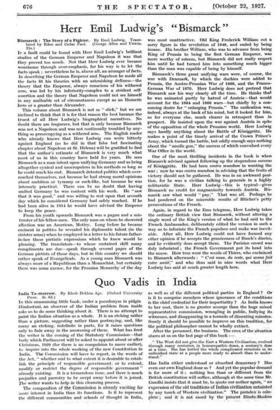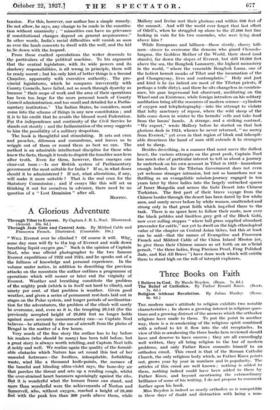Quo Vadis in India
India To-morrow. By Khub Dekhta Age. (Oxford University
Press. 3s. 6d.) , .
IN this unassuming little book, under a pseudonym in pidgin Hindustani, an observer of the Indian problem from inside asks us to do some thinking about it. There is no attempt to paint the Indian situation as a whole. It is an etching rather than a picture, suggesting rather than portraying, and, like many an etching, indefinite in parts, for it raises questions only to fade away in the answering of them. VShat has fired the writer is the coming of the -Statutory Commission—that body which Parliament will be asked to appoint about or after Christmas, 1929 (for there is no compulsion to move earlier), to inquire into the whole working of the new Constitution in India. The Commission will have to report, in the words of the Act, "whether and to what extent it is desirable to estab- lish the principle of responsible govertunent, or to extend, modify or restrict the degree of responsible government" already existing. It is a tremendous issue, and there is much prejudice and parrotry to be swept away before it is joined. The writer wants to help in this cleansing process.
The composition of the Commission is already exciting far more interest in India than its functions. Is it to represent the different communities and. schools of thought in India,
as well as of the different political parties in England ? Or is it to comprise members whose ignorance of the conditions is the chief credential for their impartiality ? As India knows fo her cost, there, is no greater scourge than the huge mixed representative commission, wrangling in public, bullying its witnesses; and disappearing in a tornado of dissenting minutes. Surely it, should be possible to improve on this tradition, for the political philosopher cannot be wholly extinct.
After the personnel, the business. The crux of the situation stares at us on the last page of this book
." The West did not give,the East a Western Civilization, evolved through many centuries, in homoeopathic doses, a century's dose at a time. She has hurled the whole complicated structure in its unfinished state' at a people more ready to absorb than to ander- stand."
Has India either understood or absorbed democracy ? Has even our own England done so ? And yet the pOpubif demand is for more of it ; nothing less than or 'different from the British constitutiOn will suffice, although at the sante time Mr. Gandhi insists that it Must be, to_qUote Our author again, "an expreSsiori of the old traditions of Indian civilization Untainted by any touch of Western civilization." The pthit.doX is cam- Plete.; 'and it. is not eased by the present Hindu-Moslem
tension. For this, however, our author has a simple remedy. Do not allow, he says, any_ change to be made in the constitu- tion without unanimity ; "minorities can have no grievance . constittitionaLchanges depend on general acquiescence." In other words, India's racial difficulties will vanish as soon as ever the lamb consents to dwell with the wolf, and the kid to..lie_down with the Jeopard. . .
From these exalted speculations the. writer descends to the particulars of the political machine. . To his argument that the central legislature, with„ its wide powers and, its shadowy responsibilities, is all wrong in principle, there will he ready assent ;.but his only hint of better things is a Second chamber, apparently with executive authority. , The pro- ,vincial legislatures, which he compares irreverently, with County. Councils, have failed, not so much through dyarchy as
• because ".! their, scope of work and the area of their operations has been too Jame for the more personal touch of County Council administration, and Oo small and detailed tot.a Parlia- nntnry institution." Thg, Indian States, he considers,. must come into the scheme ofthings in any new constitution ; and it is to his credit that he ayoids the blessed word Federation. R9..1:.the _independence and continuity of the Civil Service he stands out stoutly ; and the Indianization of the army suggests to him the, possibility of a military despotism.
The book is thoughtful and stimulating. It sets out crux and paradox, dilemma and conundrum, and leaves us to wriggle out of them or round them as best we can. The method is an admirable intellectual discipline for those who know the facts, though it tends to dispirit the humbler searchers after truth. Even for them, however, there emerges one clear-cut issue :—Is our British system of Parliamentary government the most suitable for India ? If so, in what doses should it be administered? If not, what alterations, if any, will make it, more suitable ? That is the real crux for the Statutory Commission ; and if essays like this will set us thinking it out for Ourselves in advance., there need be no question of a "Lost Dominion" after all.
MEsTox.



























































 Previous page
Previous page